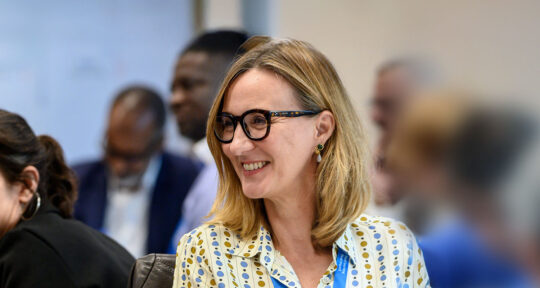12 best leadership books you should read in 2026
In today’s unpredictable world, good leadership is no longer about having all the answers. It’s about staying curious, adaptable, and ready to learn. The best leadership books don’t just tell stories of success. They challenge how we think, help us see patterns others miss, and remind us that growth begins with reflection.
As we step into 2026, the context of leadership is shifting once again. Technology is rewriting how we work. Global uncertainty is testing how we plan and people are looking for leaders who combine intelligence with empathy. The right books about leadership can help you make sense of that complexity and translate big ideas into everyday impact.
At IMD, we believe leadership is both art and practice. The authors featured here—professors, strategists, and executives—bring decades of research and lived experience to their writing. Each book bridges theory and action, offering insights that you can apply directly to your organization and your personal leadership journey.
If you’re ready to think more broadly, act more decisively, and lead with renewed purpose, here are twelve top leadership books to guide your reading in 2026.
- Books about self-leadership
- Books about leadership in organizations
- Books about leadership succession and legacy
- Books about leadership and geopolitics
Books about self-leadership
Before you can lead others effectively, you need to lead yourself with awareness, resilience, and authenticity. The books below challenge conventional ideas of what leadership looks like, showing that influence starts from within.
1. The Confidence Myth: How Women Leaders can Break Free from Gendered Perceptions
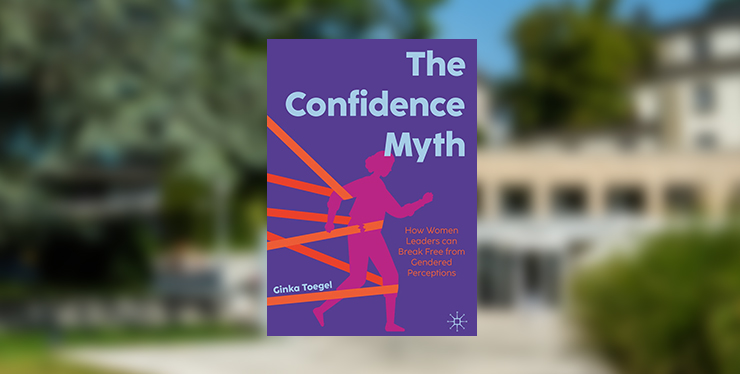
As more women move into senior leadership roles, the idea that they lack confidence no longer holds up. Yet, some misconceptions remain surprisingly persistent. Do women actually struggle with confidence, or are we simply more likely to assume they do?
In The Confidence Myth, IMD Professor Ginka Toegel takes a critical look at how this belief took hold and why it deserves to be challenged. Drawing on years of research in leadership and psychotherapy, she shows that evidence does not consistently support any major gender differences in self-confidence. The real issue, she argues, lies in perception: how confidence is seen, rewarded, and judged.
Through research-based insights and practical examples, Toegel revisits common myths found in popular leadership advice, from the notion that women “don’t ask” or are “risk-averse,” to the overuse of “imposter syndrome.” She provides both tools and evidence to help women, and the men who support them, confront these stereotypes and build strategies for sustainable career growth.
Toegel unpacks several myths that continue to distort how women’s leadership is viewed:
“Women don’t ask.”
Studies show women negotiate as often as men when given equal conditions.
“Women are risk-averse.”
Context, not gender, determines risk-taking behavior.
“Imposter syndrome is universal among women.”
Confidence gaps are often the product of biased environments, not personal flaws.
Read if: You want to challenge outdated assumptions about women’s confidence and leadership. The Confidence Myth is for leaders who aim to create fairer workplaces where authenticity, empathy, and competence are recognized as true measures of strength.
2. Care, Dare, Share: The Secure Base Coach
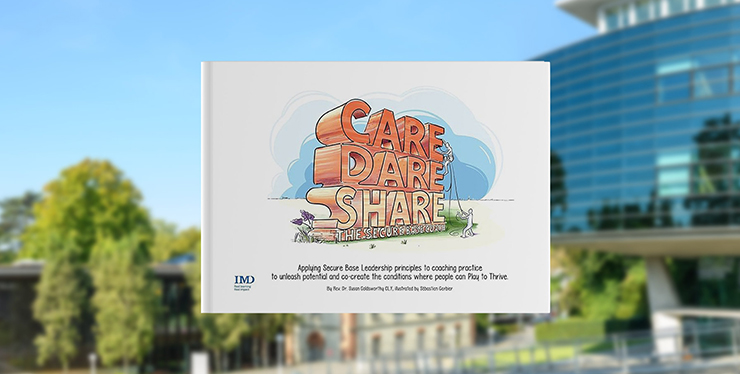
Many leaders still confuse authority with distance. In Care, Dare, Share, IMD Affiliate Professor Susan Goldsworthy introduces a transformative coaching framework designed to help individuals, teams, and organizations thrive through connection, courage, and confidence.
At the heart of secure base coaching is one simple idea: people perform at their best when they feel safe to take risks. Goldsworthy shows how creating a foundation of psychological safety allows leaders to unlock creativity, resilience, and authentic collaboration.
She distills the approach into three guiding principles that redefine modern leadership:
- Care: Provide support and empathy so people feel safe to grow.
- Dare: Encourage risk-taking and innovation by removing fear of failure.
- Share: Foster open communication and collective learning.
When applied consistently, these principles strengthen creativity and cohesion across organizations. The book blends coaching techniques with leadership science, making it one of the great books for leadership that bridge human connection and strategic performance.
Read if: You want to lead with both empathy and impact. Care, Dare, Share is for leaders who believe that lasting performance starts with trust, psychological safety, and the courage to let others thrive.
3. I by IMD: Best Practice in Leadership
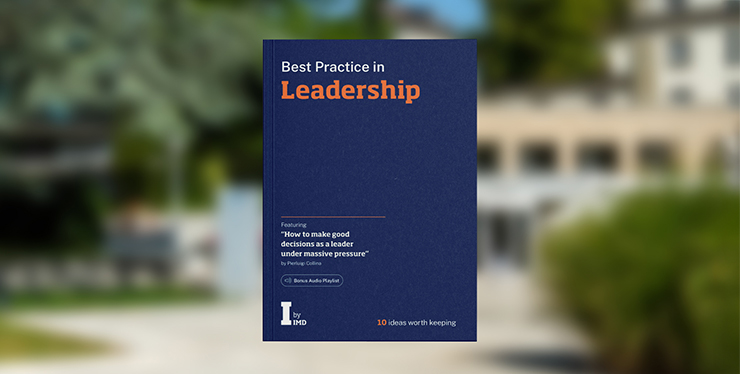
Leadership today is a careful balance of pressure and perspective, performance and purpose. I by IMD Best Practice in Leadership, edited by Stefan Michel, Dean of Faculty and Research at IMD, brings clarity to that challenge by combining decades of faculty research and executive experience into one insightful and accessible collection.
Topics range from managing impostor syndrome and understanding decision bias to leading multigenerational teams and making ethical choices under pressure. Together, they form a practical field guide for leaders seeking to transform insight into lasting impact.
Read if: You want to strengthen both your self-awareness and your team’s performance. I by IMD Best Practice in Leadership is for leaders ready to move from reflection to action and turn experience into excellence.
Books about leadership in organizations
True leadership today means mastering transformation at every level: digital, organizational, and cultural. These next reads show how great executives turn disruption into opportunity, using change itself as a catalyst to reinvent their businesses and build lasting value in a world shaped by AI and sustainability.
4. The AI-Centered Enterprise: Reshaping Organizations with Context-Aware AI
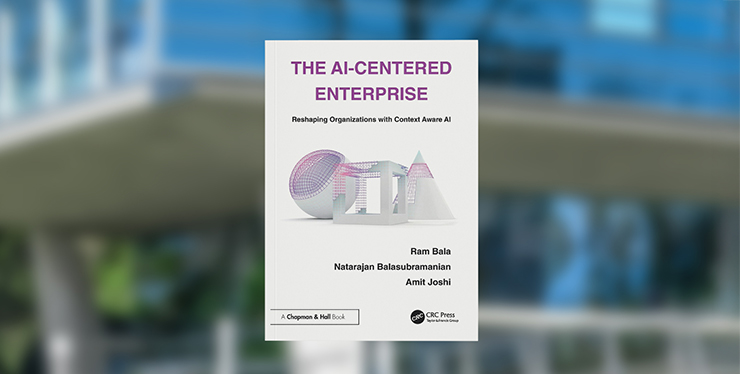
How is AI transforming the enterprise of the future?
Most companies are experimenting with generative AI, but few are using it strategically. The AI-Centered Enterprise challenges leaders to rethink their approach and move beyond quick wins toward building context-aware systems that understand not only what humans say, but what they mean.
Written by leading experts in AI and business transformation, the book explores how intelligent systems can reshape the way organizations collaborate, make decisions, and create value. Through real-world case studies and academic insight, it shows how context-aware AI represents the next stage in enterprise evolution—where technology becomes a thinking partner rather than a passive tool.
Read if: You want to move past experimentation and make AI a genuine driver of strategy. The AI-Centered Enterprise is for leaders ready to shape the future of work through intelligent, context-driven systems.
5. Twin Transformation: Merging AI and Sustainability for Competitive Advantage
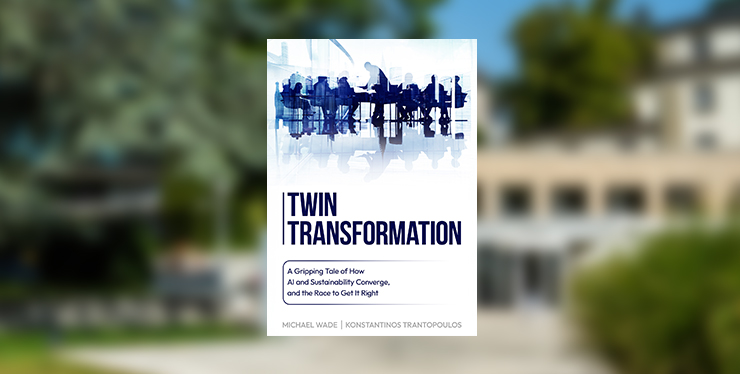
In business, AI and sustainability are often treated as separate priorities. Twin Transformation proves they are two sides of the same strategic coin. Through a vivid business novel format, IMD Professors Michael Wade and Konstantinos Trantopoulos illustrate how companies can merge digital innovation with environmental and social purpose and why those that don’t risk becoming irrelevant.
Through the story of ThermaDynamics, an industrial company struggling to reinvent itself, the authors bring the challenge of dual transformation to life. As the company races to combine AI with sustainability, its leaders confront technical, cultural, and organizational barriers that mirror those faced by real-world firms. The result is both an engaging narrative and a practical roadmap for turning convergence into growth.
Read if: You want to understand how technology and sustainability can reinforce each other while enjoying a business novel that brings transformation to life
6. GAIN: Demystifying GenAI for Office and Home
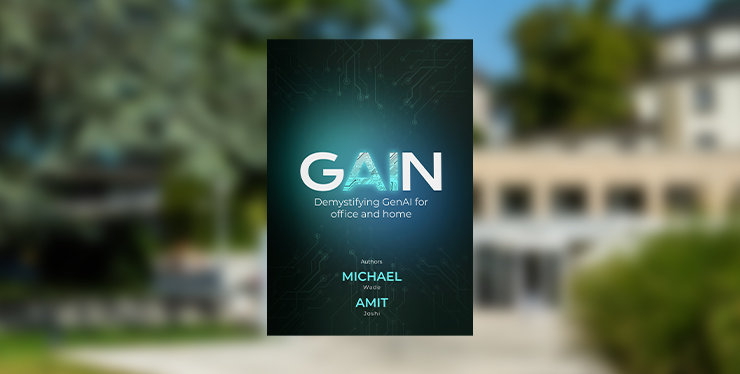
Generative AI isn’t just another tech trend: it’s changing how organizations think, work, and create value. In GAIN, IMD Professors Michael Wade and Amit Joshi, hosts of the “Mike & Amit Talk Tech” podcast, explain what makes GenAI different from every innovation that came before it.
Instead of focusing on hype or fear, they take a grounded, practical approach. Drawing on their research, teaching, and hands-on experience, they show how leaders can harness GenAI to make better decisions, improve customer experiences, and unlock new forms of creativity. Along the way, they explore how to balance innovation with responsibility, ensuring AI enhances rather than replaces human potential.
Structured for clarity and full of real-world examples, GAIN is designed for executives who want to understand GenAI without getting lost in technical detail. It helps readers separate what’s possible from what’s practical, turning complexity into clear, strategic insight.
Read if: You want to move past the buzz and learn how to use GenAI to create real business value. GAIN is for leaders who want a realistic, actionable view of how AI can empower people and shape smarter organizations.
7. Leading the Sustainable Business Transformation: A Playbook from IMD
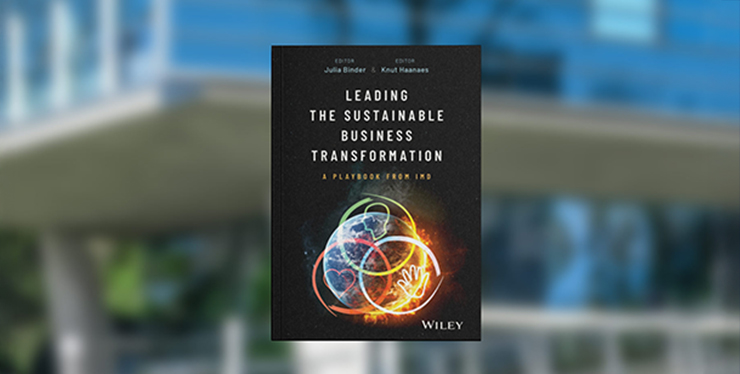
Sustainability has evolved from a corporate ideal into a strategic necessity. Leading the Sustainable Business Transformation, edited by IMD Professors Julia Binder and Knut Haanaes, captures this shift with both rigor and practicality. Drawing on years of IMD research and contributions from over 30 faculty members, the book serves as a comprehensive playbook for turning purpose into performance.
Rather than treating sustainability as a branding exercise or compliance goal, it presents it as a full-scale transformation that reshapes strategy, culture, and leadership capability. With detailed case studies, real-world insights, and a foreword by IMD President David Bach and IMD Chairman Michel Demaré, the book guides leaders through how to embed sustainability into the DNA of their organizations.
IMD’s Sustainable Leadership Framework
- Why it matters: Align long-term business success with positive societal and environmental impact.
- What it requires: Integrate environmental, social, and governance (ESG) principles into your company’s core strategy and daily operations.
- How to make it happen: Build strong governance structures, set measurable goals, and report progress with clarity and transparency.
Read if: You want a practical, research-based guide to make sustainability central to your company’s strategy. Leading the Sustainable Business Transformation is for executives who see sustainability not as a cost but as a competitive advantage that drives both performance and purpose.
Books about leadership succession and legacy
Leadership doesn’t stop at strategy or innovation. It’s also about building continuity, shaping culture, and nurturing a shared sense of purpose. These books explore what it means to lead across generations and societies, showing that true leadership is not only about progress but also about the legacy we leave behind.
8. The Family Business Book
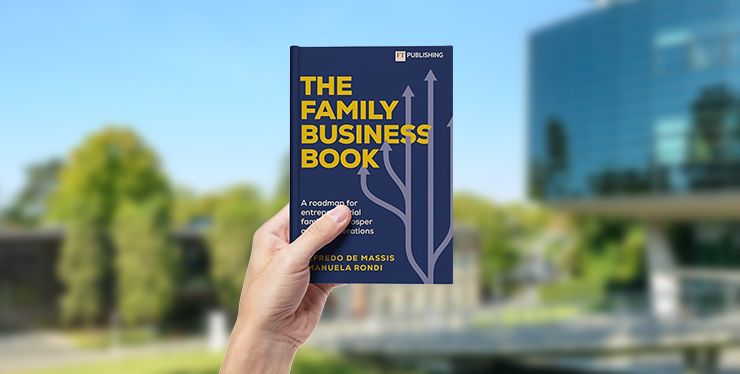
Family businesses form the backbone of most economies, yet only a small fraction successfully pass the test of time. The Family Business Book tackles this challenge head-on, offering a clear and practical guide to help entrepreneurial families prosper now and thrive for generations to come.
Written by IMD Professor Alfredo De Massis, one of the world’s leading experts in family enterprise, and Emanuela Rondi, the book combines decades of research with actionable tools. It helps readers understand the complexities of family dynamics, governance, and succession planning, while providing a structured roadmap to strengthen both business and family unity.
Packed with templates, reflection exercises, and real-world insights, it guides families in creating governance systems that respect tradition while enabling innovation. The result is a blueprint for continuity: one that turns potential conflict into clarity and long-term success.
Read if: You lead or advise a family enterprise and want to secure its future beyond the next generation. The Family Business Book is for those who see legacy not as a constraint, but as a foundation for sustainable growth.
9. Necessity Entrepreneurship: Getting Beyond the Binary (Volume 92)
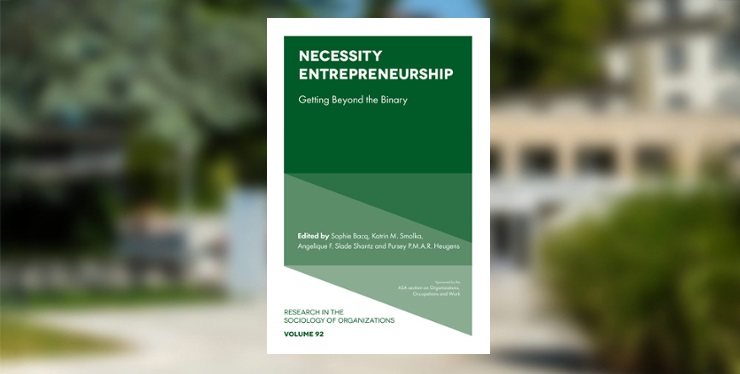
How does entrepreneurship thrive under pressure?
Not all entrepreneurship begins with opportunity…sometimes, it begins with survival. Necessity Entrepreneurship: Getting Beyond the Binary explores how individuals and communities transform basic human needs into engines of innovation and resilience.
Edited by leading scholars in the management field, the volume reframes necessity entrepreneurship not as a response to scarcity, but as a creative process grounded in cognition, collaboration, and community. It expands traditional research by highlighting how social context, institutional support, and shared purpose shape entrepreneurial success, especially in times of crisis.
Through cross-disciplinary research and innovative methodologies, including AI-based analysis and qualitative insights, the book provides a richer understanding of what drives entrepreneurs when resources are limited but determination runs high.
Read if: You want to understand how innovation emerges from constraint and how purpose-driven entrepreneurship can redefine growth in uncertain environments. This is essential reading for leaders focused on inclusive, sustainable business models that create opportunity where it’s needed most.
Books about leadership and geopolitics
The world is no longer defined by clear lines or predictable systems. Markets shift overnight, alliances evolve, and technology rewires how we work and compete.
These books help leaders make sense of complexity at scale. From the resilience of nations to the reinvention of globalization itself, they explore how stability, adaptability, and vision can coexist in a fragmented yet deeply interconnected world.
10. SuperEurope: The Unexpected Hero of the 21st Century
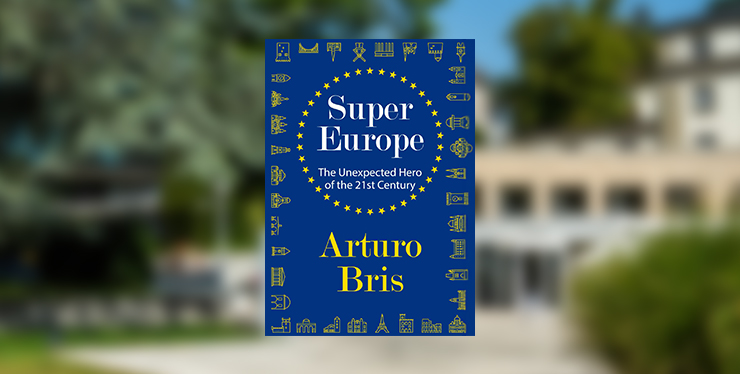
While much of the world’s attention remains fixed on the rivalry between the United States and China, IMD Professor Arturo Bris offers a compelling counterpoint in SuperEurope. Far from being a tired or overregulated continent, Europe has quietly become one of the world’s most resilient and forward-looking models of prosperity, inclusion, and governance.
Drawing on decades of crises—from the financial meltdown and Brexit to the pandemic and the war in Ukraine—Bris shows how Europe has emerged stronger each time. Its combination of strong institutions, universal healthcare, environmental leadership, and commitment to human rights has made it not just stable, but exemplary.
SuperEurope argues that the continent’s strength lies in its ability to balance prosperity with inclusion and pragmatism with principle. Yet, Bris also identifies Europe’s greatest vulnerability: a lack of self-confidence. This insecurity, he suggests, fuels populism and nostalgia at a time when Europe should instead be embracing its global leadership role.
Read if: You want a refreshing, evidence-based perspective on why Europe’s model of governance, sustainability, and cooperation still sets the standard for effective leadership in a turbulent world.
11. The State of Globalisation
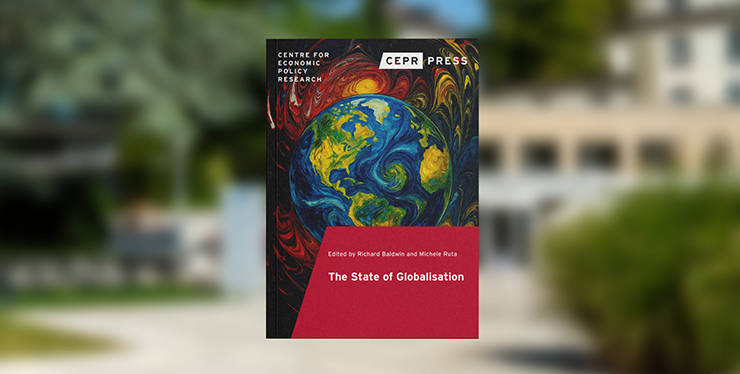
How is globalization evolving in an age of fragmentation?
Globalization is not ending, it’s changing shape. The State of Globalisation, edited by Richard Baldwin and Michele Ruta, brings together leading economists to analyze how technology, policy, and geopolitics are redefining the global economy. Far from a simple retreat, the current phase of globalization is marked by tension and transformation, where supply chains, trade flows, and investment patterns are being rebuilt in real time.
Drawing on new research presented at a landmark international conference, the book examines how these forces interact and what they mean for leaders navigating a fragmented yet interconnected world. It situates today’s shifts in a broader historical context, showing that each disruption—digitalization, protectionism, regionalization—has both risks and opportunities for cooperation and growth.
Read if: You want to understand how geopolitics, technology, and trade are reshaping globalization and what that means for business strategy. This book is for leaders who think globally and plan for resilience in an uncertain world.
12. World Competitiveness Ranking (2025 Edition)
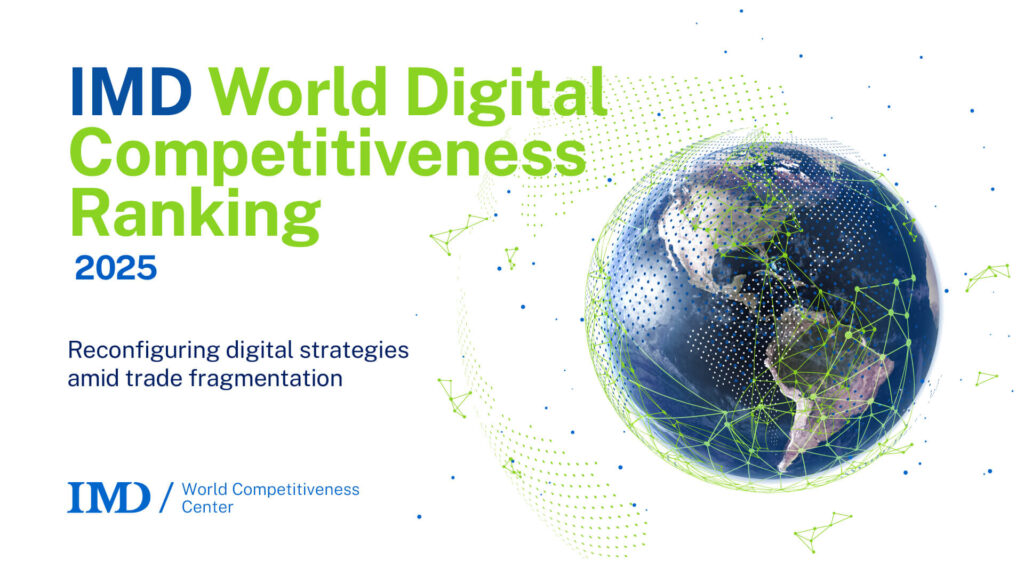
What can competitiveness teach leaders about long-term resilience?
Competitiveness is often measured in numbers—GDP, productivity, employment—but real competitiveness goes deeper. It depends on how political, social, and cultural systems work together to create lasting prosperity. That broader view is what makes IMD’s World Competitiveness Ranking such a valuable resource for leaders around the world.
Now in its 37th year, the ranking analyzes 69 economies through a mix of hard data and executive surveys to uncover what truly drives national success. The 2025 edition once again positions Switzerland, Singapore, and Hong Kong at the top, highlighting not just financial performance, but the agility, trust, and innovation that sustain their long-term strength.
The World Competitiveness Ranking offers a lens through which leaders can evaluate their own performance: how well they anticipate change, invest in people, and align purpose with progress.
Read if: You want to understand how the world’s most resilient economies sustain growth through adaptability and trust. This is essential reading for leaders shaping global strategy and seeking to build organizations that last.
Turning insight into leadership impact
Great leaders read not just to gather information, but to broaden how they think. The best leadership books don’t hand out formulas for success—they invite reflection. They make us question how we lead, how we build trust, and how we adapt when the world changes faster than we expect.
But reading is only the start. Real growth happens when ideas move off the page and into daily practice—when a concept sparks a conversation, shifts a decision, or reshapes a team. The leaders who thrive are the ones who stay curious, keep learning, and turn reflection into action.
At IMD, that mindset guides everything we do. Our approach to executive learning helps leaders translate insight into meaningful impact—developing the confidence, perspective, and judgment to lead with purpose in an uncertain world.
Stay informed with our latest insights on leadership, strategy, digital transformation and more. Explore fresh perspectives from IMD business school to help you navigate today’s complex business landscape.



